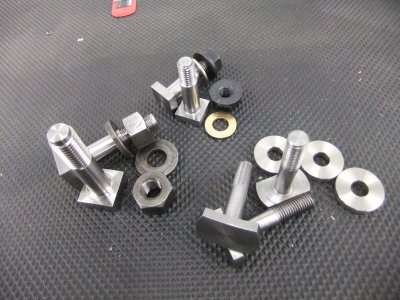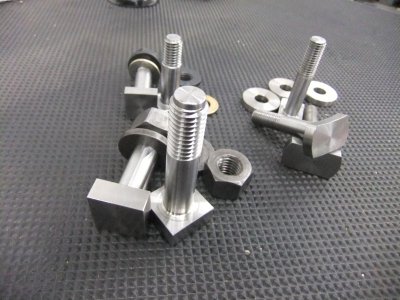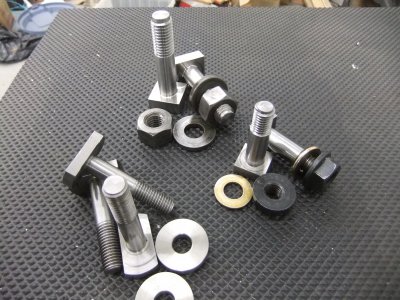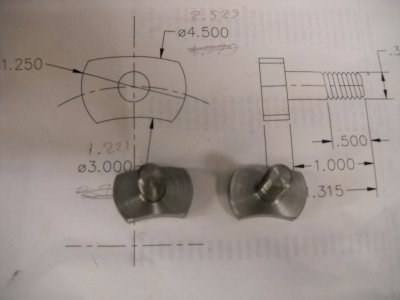The two bolts shown in your photo, are simply carriage bolts that have been touched up a bit to fit the T-slot.
This is not a very demanding application. This is not the sort of thing you need to try to get maximum strength. When you get into the details of bolted joints, there is a tremendous amount of engineering. You really don't need to make this very complicated.
I would probably make those in a grade 8 equivalent material, just because it is a little harder and will serve well with constantly being tightened and loosened. Grade 8 bolting is good for a bolt stress of about 100Ksi before yield. Normally you would load that to about 50% of that value. In your application, it will work great at a much lighter load than that. Grade 5 would also work fine. Do not use a fine thread - they may be theoretically stronger because of the slightly larger cross sectional area, however, there is a higher stress concentration at the thread root. In practice, there are many considerations that contribute to bolting not being strong enough - coarse thread vs fine thread is one consideration, but a very minor one. Regardless, your application does not need a fine thread. You want a coarse thread - which is just tougher and sets up a little bit quicker. You do not want 316SS for this application. 316SS is fantastic in many applications: corrosive service, high or low temperature, but the yield strength is pretty low.
You want plain, good'ol carbon steel in a course thread. Strictly speaking you want the T-bolt head to be curved. Of course, you can purchase a couple t-bolts and grind / file the heads until they fit your slot nicely. I prefer to make up my own t-bolts, and give them a nice big head, but one that is tuned so it moves smoothly through the slot. Sometimes the manufacturer's use such weenie little bolt heads. You don't have to mill the head all pretty, nobody is going to see it. I guarantee that you will have no trouble doing a better job than some cheap store carriage bolts with a couple flats ground on them. That is a bolt you are going to use a lot, make yourself some nice ones to be proud of.
Here are some that I've made: vise hold down, taper attachment mounting bolts, mill table securing bolts (my one mill has multiple tables - naturally when you get something at auction the little pieces, such as bolts, don't make it). I like to use heavy weight nuts for those frequent on-off applications - less tendency to round over. I also like to extend the end of the bolt a little at the threads minor diameter and file off the first 1/4 turn of thread that is just a sharp fragile edge - both these to protect the start of the thread from getting ding'd.








